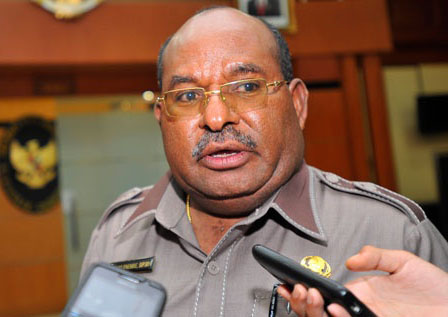
AUCKLAND (Pacific Media Watch / The Age / Jakarta Globe / UCA News): Australian newspaper The Age has rebuffed Papua governor Lukas Enembe's statement that the journalist blockade in West Papua has been lifted.
Enembe said recently he wanted to welcome reporters and non-governmental organisations (NGOs) to the region.
“Why not? There’s nothing that needs to be covered up. That would only raise questions...Please, come to [West] Papua. It’s open for everyone," the governor said in an interview with the Jakarta Globe.
However, the notion that West Papua had changed its rules on reporter and NGO access appears to be unfounded, according to The Age.
Following Enembe's statements, senator Richard Di Natale from the Australian Greens, one of the Parliamentary Friends of West Papua group, said he would go to West Papua and that he would "invite a delegation of journalists and human rights representatives" to join him on the trip.
The hope for openness was squashed by the central government in Jakarta, according to The Age, as Indonesia still required journalists to apply for special permits to go to West Papua.
Special permission
Journalists must apply to the Indonesian Department of Foreign Affairs for special permission to travel, giving all information about who they will interview, when and where.
Their application is then considered on a so-called "clearing house" meeting, involving 18 Indonesian government departments, including police and the military.
Many applications for travel features to the Raja Ampat diving site are approved, but most applications for serious reporting are rejected.
Fairfax Media has confirmed with the Indonesian Department of Foreign Affairs that the "clearing house" process remains the only legal route to West Papua.
Journalists who travel without permission face being put on a blacklist banning them from future visits to Indonesia, and correspondents resident in Indonesia confront the possibility that their immigration status may be revoked.
Governor Lukas Enembe, who was elected in April, does not have the power to overturn the policy of the central government.
His province is represented at the clearing house meeting by the Home Affairs ministry.
Change of tone
Although governor Enembe's comments did not seem to be the opening up of West Papua that many reporters and NGOs had wanted, it was still greeted as a welcome change of tone.
Enembe's comments were also added to by Ruben Magai, the head responsible for mass media at the provincial parliament.
"If security is the reason, I don't think Papua is in some kind of war state or something like that nowadays," Magai said.
Western journalists have been assured on numerous occasions in the past that permission to travel would be forthcoming and those promises have, in the past, turned out to be largely false.
Journalists who travelled to West Papua without written permission faced questioning by Indonesian authorities and possible expulsion.
The Jayapura office of the Alliance of Independent Journalists (AJI) has called the practice an unofficial, but purposeful, information blackout.
Indonesian troops have been involved in a low-level conflict with Papuan separatist organisations since the area was annexed by Indonesia in 1969 after a vote widely seen as a sham by international monitors.
Rights groups have documented extensive abuses by the military on West Papuan civilians, and some estimates put the death toll from 1963 to today at 200,000.
Activist pressure
Enembe’s remarks came after three Papuans occupied the Australian consulate in Bali recently, ahead of the Asia-Pacific Economic Cooperation (APEC) meeting.
They urged the central government to allow foreign journalists to visit West Papua freely without asking for special permission.
Four foreign journalists applied for permits last year, only one of which was approved.
Victor Mambor, head of the Alliance of Independent Journalists in Papua, acknowledged that several journalists from Australia, New Zealand and the Netherlands had faced difficulties in applying for work permits in the region.
“They had to wait up to three months. When doing their journalistic activities, after obtaining work permits, they had to be accompanied by special Indonesian officers,” he told ucanews.com.
Activists 'forced' to leave consulate, call for greater press freedom
This work is licensed under a Creative Commons Attribution-NonCommercial 3.0 New Zealand Licence.




